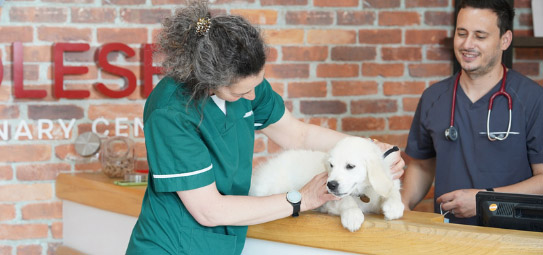
Firework season is coming: advice for cat, dog, and rabbit owners
September 2, 2022
Now, isn’t that the sight you want to see on Firework night – your pets relaxed and sound asleep? Unfortunately, loud bangs and bright flashes can feel scary to even the most confident and assured pets, which is why the team at Molesey Vets are recommending that pet owners prepare now for ‘firework season’.
Download: How to build a safe haven for your pet
When is ‘firework season’? Typically, fireworks start being set off during the weekends surrounding bonfire night (November 5th) and can occur on and off throughout the rest of the year. The problem with fireworks and other sudden noises is that they put pets into ‘fight or flight’ mode. More often than not this means they try to run away, increasing their chances of getting lost or injured.
Check out all our advice below and put a plan in place now to help your cat, dog, or rabbit cope in the coming weeks.
How to prepare your pets for fireworks
1. Microchip, microchip, microchip
Check your contact details are up to date on the microchip database your pet is registered to. If your cat or dog isn’t microchipped yet, it’s important to get that done asap. For dogs it’s the law and soon will be for cats too, and you will stand a much better chance of being reunited with them if they get spooked by a firework and bolt. Rabbits can also escape and can also be microchipped.
Book a pet microchipping appointment at Molesey Vets
2. Noise desensitisation techniques for puppies & adult dogs
Ideally, you will have started practicing noise desensitisation techniques with your puppy during their key socialisation phase of 8-14 weeks of age and carried on with this training as they got older. If not, even a few months before firework season can be helpful. It may be too late to see results for this year, but you can start this now for the future: download ‘Scary Sounds’ – a Sound Training Therapy Program by Sarah Heath.
3. Pet calming products
Talk to our Molesey veterinary nurses about pet calming products such as plug-in diffusers, sprays, and collars. These devices mimic the appeasement pheromones of pets, to encourage feelings of calm and contentment. With most products, you need to start using them a few weeks in advance of the event for the best results. If you know your pet will be absolutely terrified of fireworks (trembling, barking continuously, drooling excessively), we may be able to prescribe calming medication. Get in touch to discuss calming solutions for your pet
4. Create a safe haven
It is wise to create a safe space for your cat or dog at least a week in advance – it could even become a permanent fixture. This will give your pet somewhere to retreat to if they feel scared. You can encourage them to relax in this space by placing treats or toys inside. You should leave them be whilst they are in there, but the occasional ‘check-in’ is fine.
To help you, our team have put together a guide on ways to create a safe haven for your dog or cat. You can down load this here:
Small furry pets should always have a safe space that can insulate them from noise i.e., lots of fresh, clean bedding in a solid box-like structure.
5. Bring small furries indoors
When you know the noise level will rise, (such as the period around bonfire night, Guy Fawkes & New Year) house pets in a quieter place inside your home. This will help with the colder temperatures this season in Surrey too. Placing a blanket or duvet over an enclosure (whilst maintaining adequate ventilation) will help with the noise and cold as well.
What to do ‘on the day’
Here are our team’s top tips for keeping pets safe on a ‘firework day’:
A. Exercise dogs during the day; keep them on a lead so they can’t bolt if one is set off early.
B. Keep pets indoors at night – ensure they can’t escape via a garden or open front door. Staying indoors can stress some cats out so make sure they can go out when it’s safe.
C. Secure doors and cat flaps, shut windows, and close the curtains to dampen the noise & hide the flashes.
D. Turn the TV or radio volume up a little to drown out the loud bangs.
E. Don’t leave pets home alone too long and leave background noise on if you go out.
F. Leave them be if they prefer – a searching hand may not be welcomed by a scared pet in hiding.
G. Treat filled toys and interesting puzzles are a good way to distract pets.
Monitor stress
Finally, it’s important to understand the signs and monitor your pet for stress – changes in eating/toileting habits, increased vocalisation (cats & dogs), hiding most of the time, freezing/reluctance to move, appearing nervous/jumpy, sitting hunched, aggression, chewing their cage (small furries), intense grooming, or scratching that causes fur to fall out, are common signs of a stressed pet.
Call us on 0208 979 1384 if your pet is showing signs of stress. For rabbits especially, not eating for over 6 hours can become an emergency very quickly.
We hope you found this advice from our team helpful and are ready to get into action. Remember to check out our guide;



